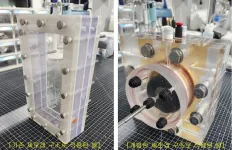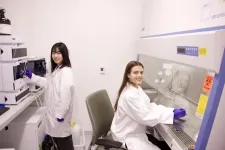(Press-News.org)
The Davos Alzheimer’s Collaborative (DAC), a pioneering worldwide initiative seeking to cure Alzheimer’s disease and improve brain health, today announced they will work with Janssen Research & Development, LLC, a Johnson & Johnson company, and Beckman Coulter Diagnostics, two leading pharmaceutical and diagnostics companies, to advance the assay validation of blood-based biomarkers (BBMs) for Alzheimer’s disease for global use in diverse populations.
DAC, via its Global Cohorts Program, has enabled this trans-national, multi-party collaboration and provided support for bio sample collection at the Catholic University of Korea (CUK) in South Korea in a study led by Hyun-Kook Lim, MD PhD. The samples will represent people across all stages of Alzheimer’s disease—healthy control, mild cognitive impairment, pre-clinical Alzheimer’s disease, and Alzheimer’s disease—based on clinical assessments and amyloid PET confirmation.
DAC’s efforts to build an ecosystem of industry partners is meant to bridge knowledge gaps of low and middle-income country populations and enable the development of globally generalizable blood-based tests for Alzheimer’s disease. Going forward, DAC aims to catalyze biological sample collection across its global cohorts and generate similar insights from other populations around the world.
“The opportunity to partner with the Davos Alzheimer's Collaborative enables our work at Beckman Coulter Diagnostics to develop a scalable, patient friendly blood-based test for Alzheimer’s disease,” said Zivjena Vucetic, MD, PhD, Chief Medical Officer at Beckman Coulter Diagnostics. “DAC’s access to a wide range of Alzheimer’s disease patient cohorts, especially from under-represented populations, highlights the true heterogeneity of the disease. Accessing diverse patient samples is critical to our ability to develop a high-quality, reliable immunoassay test available to patients around the world.”
BBMs hold promising potential to transform the Alzheimer’s disease diagnostic pathway and patient journey. Blood collection is less invasive, less costly, and is already well-established in clinical practice, meaning it can be performed in various settings, is widely accepted by patients, and requires no further specialized training for healthcare professionals. Successful deployment of BBMs will provide patients with critical diagnostic information and improve access to appropriate care. BBMs could greatly reduce the burden of biomarker testing by triaging patients or potentially confirming the presence of beta amyloid at scale.
This inclusive research program is critical to DAC’s work to diversify research since nearly all BBM studies in Alzheimer’s disease to date have been conducted on Caucasian populations of Western European or American origin.
“This program is an important demonstration of DAC’s commitment to increasing diversity and trans-national collaborations in Alzheimer’s disease research. Our partnerships with the Catholic University of Korea, Janssen Research & Development, LLC, and Beckman Coulter will enable development of more robust and globally valid diagnostics blood tests for Alzheimer’s disease,” said Vaibhav Narayan, DAC Executive Vice President.
Note: To accomplish its mission to diversify research, DAC welcomes collaboration with research institutions, startups, industry partners and others. Of particular interest are partners that do a variety of analyses (genetics, epigenetics, proteomics) to generate maximum biomarker and diagnostic insights. If you are interested in contributing to DAC research or supporting its work, please contact Irene Meier, Executive Director, Program Strategy and Operations._____________________________________________________________________________
About the Davos Alzheimer’s Collaborative
The Davos Alzheimer's Collaborative (DAC) is a pioneering worldwide initiative to cure Alzheimer’s disease and improve brain health, seeking to mirror the success of global efforts against infectious diseases such as HIV/AIDS, Covid, and Malaria. DAC is extending global research beyond its current focus on traditional Western European ethnic populations into the highly diversified populations of the Global South, where the vast majority of those with Alzheimer’s live. By introducing lower-cost screening and diagnostic tools as well as new treatment and prevention modalities in primary care and community health settings, DAC is driving implementation of health system solutions that are appropriate for worldwide application. DAC also promotes the vital importance of brain health throughout the lifespan by addressing cardiometabolic and lifestyle factors, especially in early and mid-life. Absent effective action at scale around the world, by 2050, more than 150 million families and half a billion people will be personally impacted by dementia, creating a social, financial, economic, and global security disaster of historic proportions. DAC was launched in Davos in 2021 by the World Economic Forum and the Global CEO Initiative on Alzheimer's Disease. For more information, please visit: davosalzheimerscollaborative.org.
###
END
Dr. Jwa Eunjin and her research team at the Korea Institute of Energy Research (KIER) have achieved a significant breakthrough in clean energy technology. The team has successfully enhanced a crucial component of a bio-electrochemical cell, enabling more efficient hydrogen production from microorganisms found in waste. This advancement resolves longstanding power loss challenges in conventional processes, offering a transformative pathway toward large-scale, cost-effective hydrogen production.
Biogas, a renewable ...
Asians, non-Hispanic Blacks and Hispanics were significantly less likely than whites to use obesity-management medications to lower their weight compared with whites, new research suggests. The differences could not be fully explained by income or education level, health insurance coverage or clinical need.
The study, published in the peer-reviewed Journal of Racial and Ethnic Health Disparities, is one of the few to compare the use of obesity-management medications across racial and ethnic groups, and the first to consider ...
A review of 3,000 studies also suggests these minute plastic air particles may be causing male and female infertility.
Tires and degrading garbage shed tiny pieces of plastic into the air, creating a form of air pollution that UC San Francisco researchers suspect may be causing respiratory and other illnesses.
A review of some 3,000 studies implicates these particles in a variety of serious health problems. These include male and female infertility, colon cancer and poor lung function. The particles also may contribute to chronic pulmonary inflammation, ...
Smartwatches and fitness trackers have become ubiquitous forms of wearable tech, accompanying many people throughout their days (and nights). But they may expose the skin to so-called forever chemicals in the process. More expensive wristbands made from fluorinated synthetic rubber revealed particularly high amounts of one forever chemical, perfluorohexanoic acid (PFHxA), according to a study published in ACS’ Environmental Science & Technology Letters.
“This discovery stands out because of the very high concentrations of one type of forever chemical found in items that are in prolonged contact with ...
To guard against harmful waterborne pathogens, many consumers, including managers of health-care facilities, install antimicrobial silver-containing showerheads. But in ACS ES&T Water, researchers now report that these fixtures are no “silver bullet.” In real-world showering conditions, most microbes aren’t exposed to the silver long enough to be killed. However, the composition of rare microbes in water from these showerheads varied with each type of fixture tested.
The stream of droplets and fine mist that form during a shower could be inhaled or swallowed. Installing showerheads ...
After participating in a global clinical trial, leaders at the Children’s Hospital Colorado (Children’s Colorado) Center for Cancer and Blood Disorders and the University of Colorado Cancer Center are celebrating results so transformative, they change the standard of care for treating most kids with B-cell acute lymphoblastic leukemia (B-ALL), the most common form of childhood cancer. The new therapy is less toxic than traditional chemotherapy, resulting in significantly fewer side effects like severe infections, mouth sores and bone marrow suppression, ...
For roughly a century, ever since Alexander Fleming’s accidental discovery of penicillin in 1928, fungi have proven to be a goldmine for medicines. They’ve provided treatments for a wide range of diseases, from infections and high cholesterol to organ rejection and even cancer.
However, the process by which fungi synthesize some of their most potent compounds remains opaque. This is especially true of cyclopentachromone, a key building block in fungal products whose derivatives have shown promise in fighting cancer and reducing inflammation, among other medicinal properties.
Reading Nature’s Instructions
While chemists have made progress in creating ...
Mill Valley, CA – December 18, 2024 – The SynGAP Research Fund 501(c)(3) dba Cure SYNGAP1 announced a $108,867 grant to Dr. Michael Courtney and Dr. Li-Li Li at the Turku Bioscience Centre, University of Turku, Finland, to advance their research on SYNGAP1 missense variants. Their project seeks to better understand the functional impact of these mutations and explore drug repurposing as a potential therapeutic approach.
Dr. Courtney’s team will use advanced phenotyping techniques to assess how SYNGAP1 missense variants impact the protein’s ...
NEW YORK, NY (Dec. 18, 2024)--Women born in the most sexist U.S. states experience faster memory decline in later years compared to women born in the least sexist states, a new study by researchers at Columbia University Vagelos College of Physicians and Surgeons has found.
The difference between being born in the most versus the least sexist state was equivalent to nine years of cognitive aging.
The study is one of a growing number of studies that have investigated links between structural sexism and health. Structural sexism, like structural racism, does not refer to personal incidences but to inequality in resources and power ...
To identify and follow blood vessel-related changes in the brain that contribute to cognitive impairment and dementia, researchers and clinicians typically rely on MRI to evaluate “downstream” biological markers – those at the end of a cascade of events. But a multicenter study led by UCLA researchers could lead to a cost-effective blood test to identify changes occurring near the top of the chain, potentially identifying at-risk patients at an earlier stage.
“We studied a protein in the blood that is critical in the formation ...





